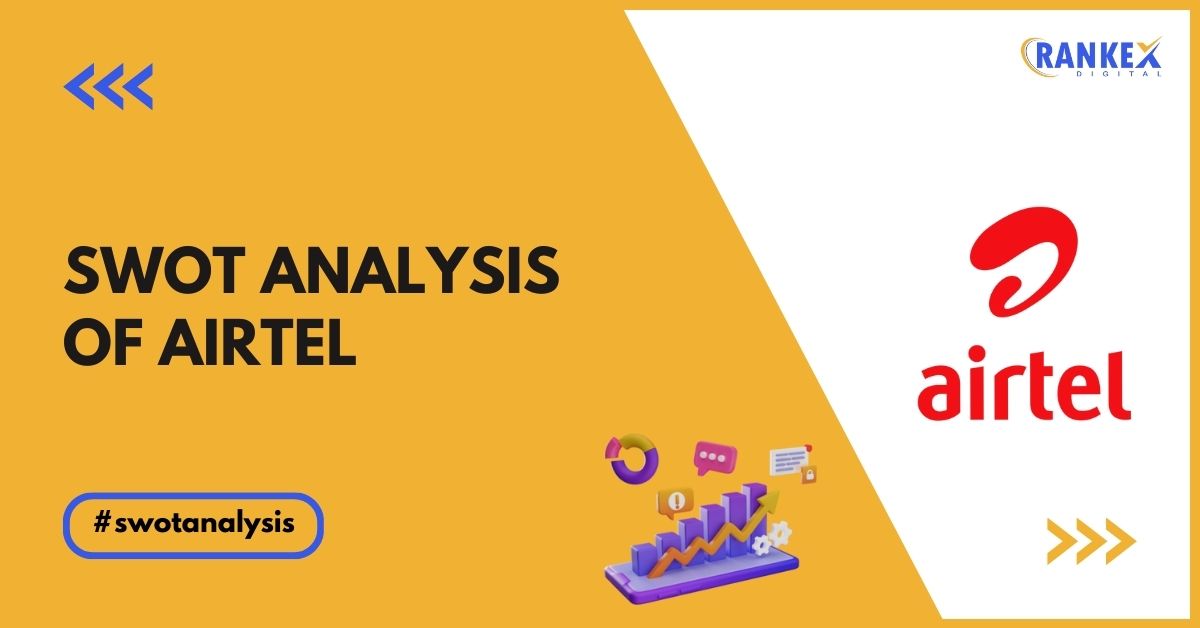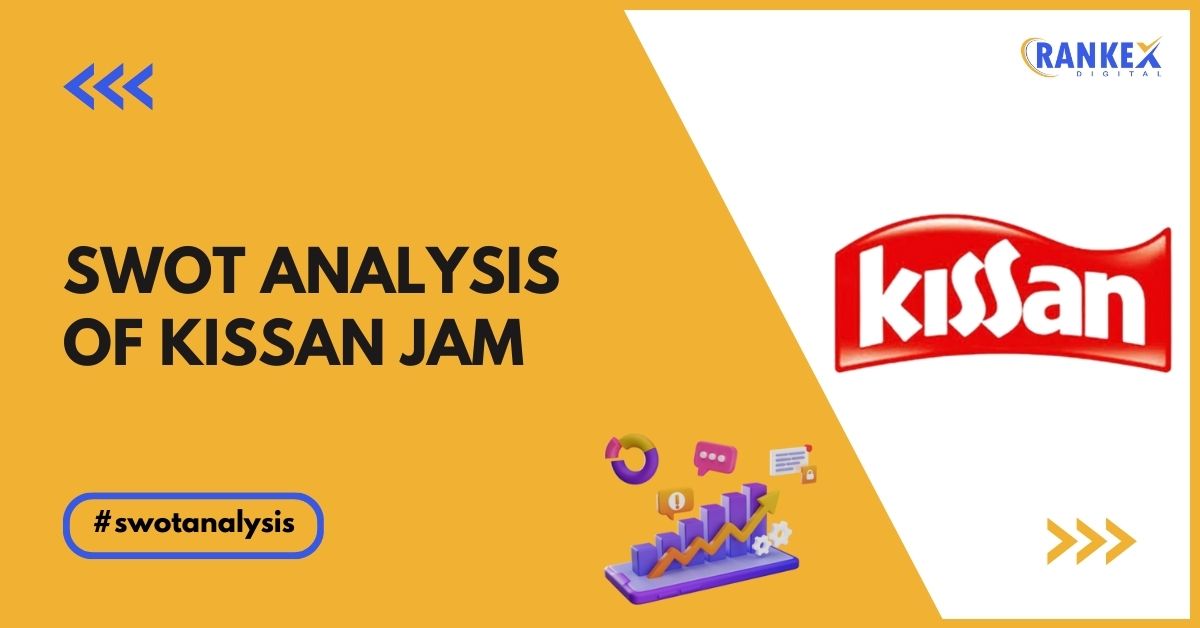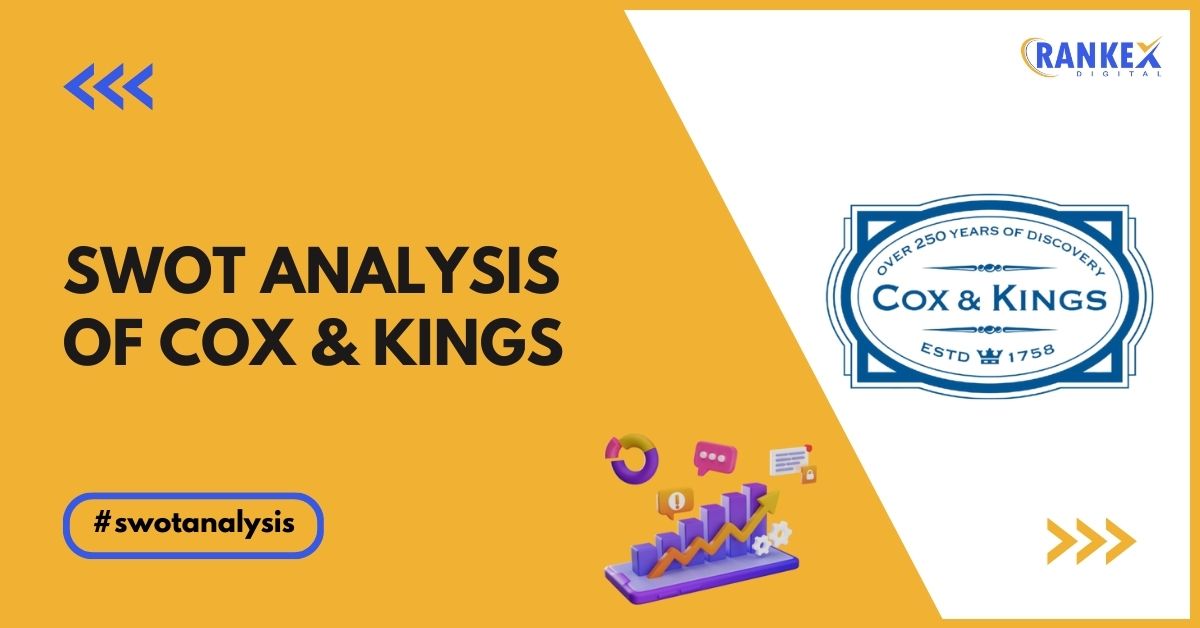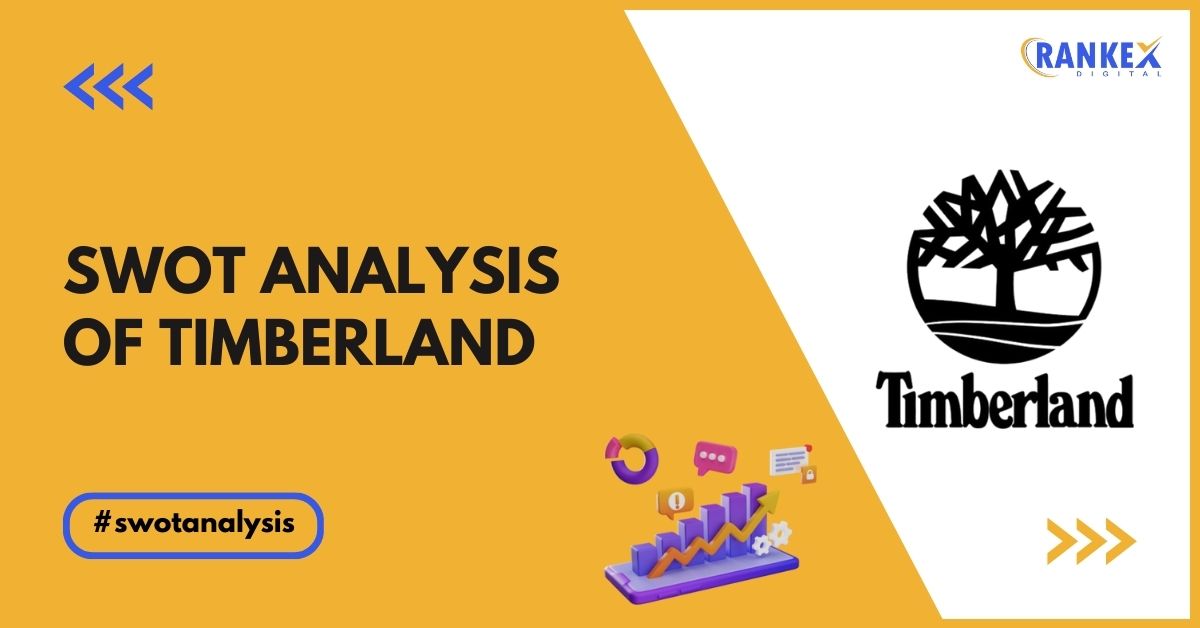Bharti Airtel, one of the largest telecommunications companies in the world, continues to be a significant player in the telecom industry.
With a broad portfolio spanning mobile services, broadband, digital TV, and enterprise solutions, Airtel maintains a strong foothold across India and emerging markets in Africa and South Asia.
This SWOT analysis of Airtel highlights its current strengths, weaknesses, opportunities, and threats as it navigates the evolving telecom landscape.
Table of Contents
Overview of Airtel
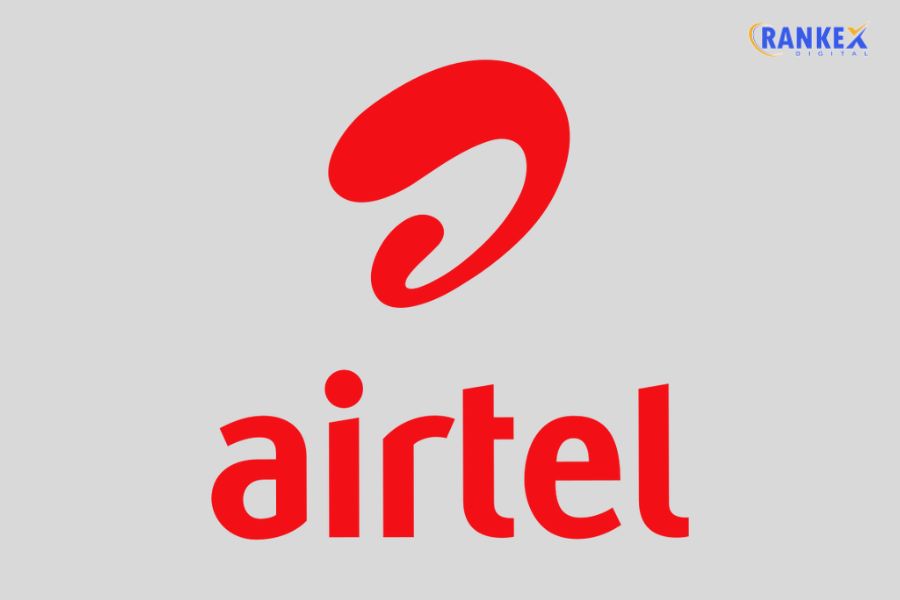
| Founder | Sunil Bharti Mittal |
|---|---|
| Year Founded | 1995 |
| Origin | India |
| Industry | Telecommunications |
| Annual Revenue | $16+ Billion (FY 2023) |
| Employees | 15,000+ |
Airtel offers an extensive range of services, including mobile voice and data, high-speed broadband, digital television, and enterprise solutions. It operates in 18 countries across Asia and Africa.
Current News on the Market on Airtel
- 5G Rollout: Airtel is aggressively expanding its 5G network across major cities in India, aiming to cover a significant portion of the country by 2025.
- Digital Transformation: The company continues to push for digitization, offering innovative services such as Airtel Xstream, a digital TV platform, and Airtel Payments Bank, to create a comprehensive digital ecosystem.
- Partnership with Tech Giants: Airtel has formed strategic alliances with tech leaders like Google and Facebook to bolster its digital offerings, including cloud services, AI capabilities, and mobile payments.
- International Expansion: Airtel is strengthening its presence in Africa by investing in its telecom infrastructure and launching new digital services to cater to underserved regions.
- Financial Performance: Airtel has reported consistent growth in revenue due to increasing data consumption, digital services adoption, and successful cost-management strategies.
SWOT Analysis of Airtel
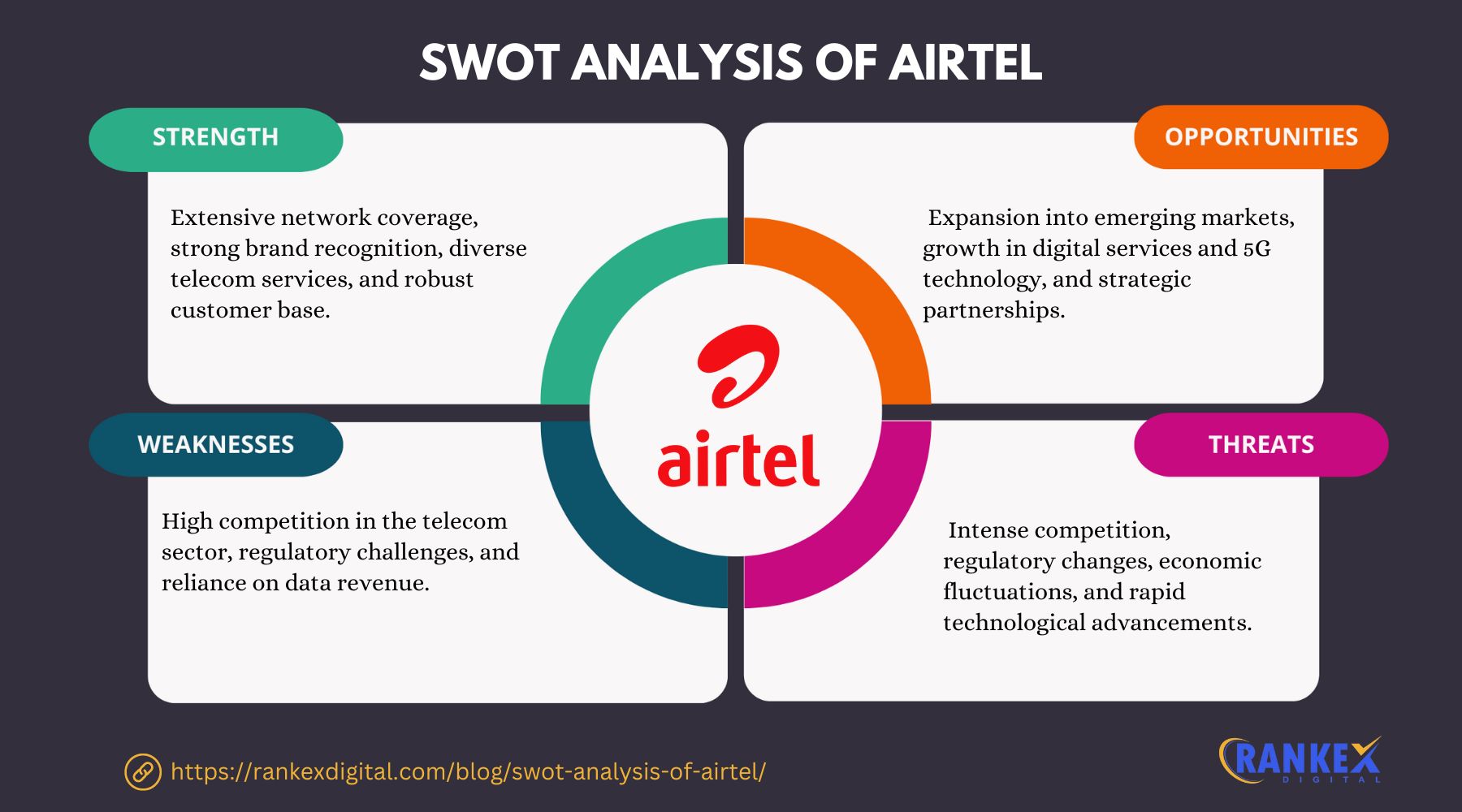
Strengths of Airtel
- Market Leadership in India
Airtel is one of the top telecom operators in India, holding a significant market share in both mobile services and broadband. It benefits from strong brand recognition and customer loyalty across diverse segments. - Broad Service Portfolio
Airtel’s diverse range of services, including mobile voice and data, fibre broadband, digital TV, and enterprise solutions, allows it to cater to both individual and corporate customers. This diversity mitigates the risk of dependency on a single revenue stream. - 5G Early Adoption
Airtel’s early rollout of 5G technology positions it as a leader in next-generation telecom services in India. This allows the company to attract premium customers and offer advanced connectivity solutions for enterprises. - Strong Global Presence
Airtel’s operations in 18 countries, particularly in South Asia and Africa, provide it with access to rapidly growing markets. Its presence in these regions helps diversify its revenue and reduce dependency on the Indian market. - Strategic Partnerships
Airtel has formed strategic partnerships with global tech companies like Google, Facebook, and Microsoft. These partnerships enable Airtel to offer advanced services such as cloud computing, AI solutions, and digital payments, strengthening its digital ecosystem.
Weaknesses of Airtel
- High Debt Levels
Airtel’s heavy capital expenditure on 5G spectrum acquisition and infrastructure development has led to a high debt burden. This could strain the company’s financial resources and impact its ability to invest in future growth initiatives. - Intense Price Competition
The Indian telecom market is highly price-sensitive, with stiff competition from major players like Reliance Jio and Vodafone Idea. Airtel has been forced to engage in price wars, which can erode profitability. - Dependence on the Indian Market
A significant portion of Airtel’s revenue comes from India, making the company vulnerable to changes in the Indian regulatory environment, economic conditions, and market saturation. - Challenges in Africa
While Airtel has a growing presence in Africa, the region poses challenges such as unstable political environments, regulatory issues, and lower purchasing power, which can affect profitability and long-term growth. - Quality of Service Concerns
Despite significant investments in infrastructure, Airtel continues to face criticism regarding service quality, including network congestion and inconsistent speeds, particularly in rural and underserved areas.
Opportunities for Airtel
- Expansion of 5G Services
With the demand for faster internet and more reliable connectivity increasing, Airtel’s continued expansion of its 5G network provides significant growth opportunities in both consumer and enterprise segments. 5G services can enable smart cities, IoT solutions, and enhanced cloud services. - Growing Demand for Digital Services
As more consumers shift to digital platforms for entertainment, education, and communication, Airtel can capitalize on this trend by expanding its digital content services, such as Airtel Xstream, and enhancing its broadband offerings. - Rising Data Consumption
The increasing adoption of smartphones, streaming services, and online gaming presents an opportunity for Airtel to boost its data revenues. With more users relying on mobile data, Airtel can introduce tailored data plans and services to meet specific needs. - Enterprise Solutions and Cloud Services
Airtel can further expand its enterprise solutions by offering advanced connectivity, cloud services, cybersecurity, and IoT solutions to businesses. The growing demand for remote work solutions and digital transformation across industries offers significant opportunities for Airtel to grow its B2B business. - Africa as a Growth Market
Airtel has substantial growth opportunities in Africa, where mobile penetration is still relatively low. By expanding mobile services, digital banking, and internet connectivity in underserved regions, Airtel can tap into this emerging market.
Threats to Airtel
- Intense Competition
Airtel faces fierce competition from Reliance Jio, Vodafone Idea, and other telecom operators in India, as well as local competitors in Africa. This competition can lead to price wars, eroding margins and customer base. - Regulatory Challenges
The telecom industry is highly regulated, and Airtel faces ongoing regulatory challenges, including spectrum auctions, compliance with telecom policies, and changes in tariff structures. Regulatory changes could increase costs or limit growth opportunities. - Technological Disruption
Rapid advancements in technology could pose a threat to Airtel if the company fails to keep pace with innovations in the telecom and digital services sectors. Emerging technologies like satellite internet (e.g., Starlink) could disrupt traditional telecom services. - Economic Slowdowns
Global and regional economic slowdowns, inflation, or recessions could affect consumer spending, particularly in the telecom sector, where discretionary spending on premium services may decline. - Cybersecurity Risks
As a telecom and digital services provider, Airtel is exposed to cybersecurity risks, including data breaches, service interruptions, and cyberattacks. A significant security incident could damage Airtel’s reputation and lead to regulatory penalties.
Competitors of Airtel
- Reliance Jio
Reliance Jio is Airtel’s biggest competitor in the Indian market, known for its aggressive pricing and vast 4G network. Jio’s rapid expansion into digital services, broadband, and content platforms poses a direct threat to Airtel’s market share. - Vodafone Idea (Vi)
Despite its financial challenges, Vodafone Idea remains a key competitor in the Indian telecom market. The company is working to stabilize its operations and retain customers through competitive pricing and service enhancements. - MTN Group
In Africa, Airtel faces stiff competition from MTN Group, which is the largest telecom operator on the continent. MTN’s strong brand presence and extensive network infrastructure make it a formidable competitor in several African countries. - BSNL
Bharat Sanchar Nigam Limited (BSNL) is a government-owned telecom operator that offers mobile and broadband services in India. While it primarily caters to rural areas, it still competes with Airtel in specific regions. - Tata Communications
Tata Communications is a major player in enterprise connectivity, cloud services, and digital transformation solutions. Its focus on the B2B segment competes with Airtel’s enterprise solutions offerings.
Conclusion
Airtel remains a strong player in the global telecommunications market, with leadership in India and a growing presence in Africa. Its strengths lie in its robust service portfolio, early 5G adoption, and strategic partnerships with global tech giants.
However, the company must address challenges such as high debt levels, intense price competition, and regulatory risks to maintain its competitive edge.
With opportunities in 5G expansion, digital services, and Africa’s untapped markets, Airtel is well-positioned for future growth but must remain vigilant to the threats posed by technological disruption, competition, and economic uncertainty.
Frequently Asked Questions
1. What are Airtel’s strengths?
Airtel’s strengths include market leadership in India, a broad service portfolio, early adoption of 5G, a strong global presence, and strategic partnerships with tech giants like Google and Facebook.
2. What are Airtel’s weaknesses?
Airtel’s weaknesses include high debt levels, intense price competition, overdependence on the Indian market, challenges in Africa, and quality of service concerns in certain regions.
3. What opportunities does Airtel have in 2025?
Airtel’s opportunities include expanding 5G services, growing demand for digital content, rising data consumption, enterprise solutions, and untapped growth potential in Africa.
4. What are the main threats to Airtel in 2025?
Airtel faces threats from intense competition, regulatory challenges, technological disruption, economic slowdowns, and cybersecurity risks.

